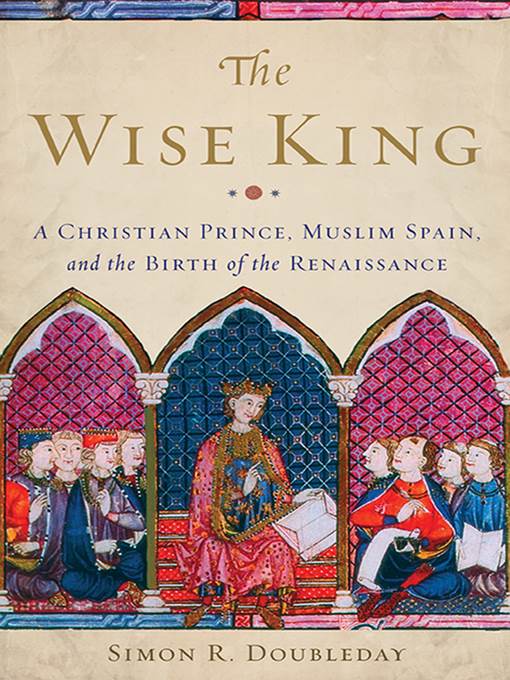
The Wise King
A Christian Prince, Muslim Spain, and the Birth of the Renaissance
کتاب های مرتبط
- اطلاعات
- نقد و بررسی
- دیدگاه کاربران
نقد و بررسی

October 5, 2015
In this insightful biography of Alfonso X of Castile and León (1221–1284), Doubleday, a professor of history at Hofstra University and editor-in-chief of the Journal of Medieval Iberian Studies, illuminates the complexity of society in 13th-century Spain and, through the figure of the king, “exorcises the myth that medieval Europe was mired in a dark age.” Doubleday recounts Alfonso’s life in roughly chronological order while giving each chapter a theme—hunting, friendship, medicine, etc.—that contextualizes medieval Spanish society. Alfonso, known as the Wise, acquired and wrote books, and he ordered translations from Arabic, Hebrew, and Latin into Castilian, even commissioning a version of Muhammad’s night journey to Jerusalem. But Doubleday doesn’t paint Alfonso’s reign as utopian; much of it was spent continuing the conquest of the Muslim kingdoms, though he did join forces with them as allies when necessary. Alfonso also taxed his subjects dry to support his attempts to become the Holy Roman emperor, and at the end of his life his sons rebelled against him. Throughout, Doubleday pulls quotations from the many books that Alfonso read and wrote, letting readers into the mind of the thoughtful, devout, flawed king who desired wisdom and good governance above all. Agent: Deirdre Mullane, Mullane Literary.

September 15, 2015
The life and times of a Spanish monarch who invigorated cultural life. For more than 30 years, Alfonso X (1221-1284) reigned over a country beset by divisiveness, strife, and uncertainty. As Doubleday (History/Hofstra Univ.; co-editor: Why the Middle Ages Matter: Medieval Light on Modern Injustice, 2011, etc.) portrays him in this deeply researched history, Alfonso aspired to be a "teacher to his people," ensuring "not only their political unity but also their happiness and well-being." Kings, Alfonso believed, "resemble a mirror in which men view their own images." He hoped to reflect "a Solomon...bequeathing his wisdom to his subjects and to future generations." Literate in history, science, and the arts, Alfonso wrote texts that long survived him: songs, works on astronomy and astrology, and a legal and philosophical tract that influenced United States law into the 19th century. He aimed to institute reforms that would mark "a first step away from an older feudal order" to a rational, centralized government in which "the king and people had mutual obligations." Central to Alfonso's beliefs was the importance of happiness. He promoted games and sport, incorporated comedy in his religious songs, and delighted in dirty jokes. Laughter, he believed, was "good medicine." Doubleday helpfully contextualizes Alfonso's convictions and actions. He explores, for example, the place of humor in medieval culture; the meaning of friendship; attitudes about fatherhood; and assumptions about planetary and astral influence on human life. He asserts that Alfonso created a Castilian Renaissance centuries before the more famous Italian artistic flourishing, but he is also clear about the king's shortcomings. Challenged by Muslim rebellion, roiling European politics, betrayal by family and friends, and repeated thwarting of his campaign to become Holy Roman emperor, Alfonso could be rash, vindictive, and manipulative. Drawing on Alfonso's writings, contemporary-often contradictory-sources, and much scholarship, Doubleday has created a measured, persuasive history of a king and his precarious times. An illuminating biography of "an intelligent and thoughtful man."
COPYRIGHT(2015) Kirkus Reviews, ALL RIGHTS RESERVED.

October 15, 2015
The Middle Ages have long been categorized as an infertile intermission between the classical Greek and Roman world and the Renaissance. This view has slowly been eradicated by scholars, yet the popular perception of the Dark Ages persists. Doubleday (The Lara Family) here debunks the myth. His investigation of Alfonso X of Castile (1221-84) depicts a multifaceted king whose interests ranged from astronomy to literature, art, hunting, board games, music and architecture. Alfonso also showed a surprising degree, for the time period, of tolerance and appreciation for both Muslim and Jewish cultural contributions, seeking to incorporate meritorious aspects of these societies into his kingdom. That the king was able to pursue so many intellectual interests in the midst of vying for corporeal gains, and the mantle of the Holy Roman Emperor, speaks to his virtuosity. Doubleday convincingly reasons that Alfonso was the epitome of a renaissance man. VERDICT This thorough portrait of an important medieval ruler and philosopher will be beneficial to the study of medieval kingship and philosophy.--Brian Renvall, Mesalands Community Coll., Tucumcari, NM
Copyright 2015 Library Journal, LLC Used with permission.

























دیدگاه کاربران